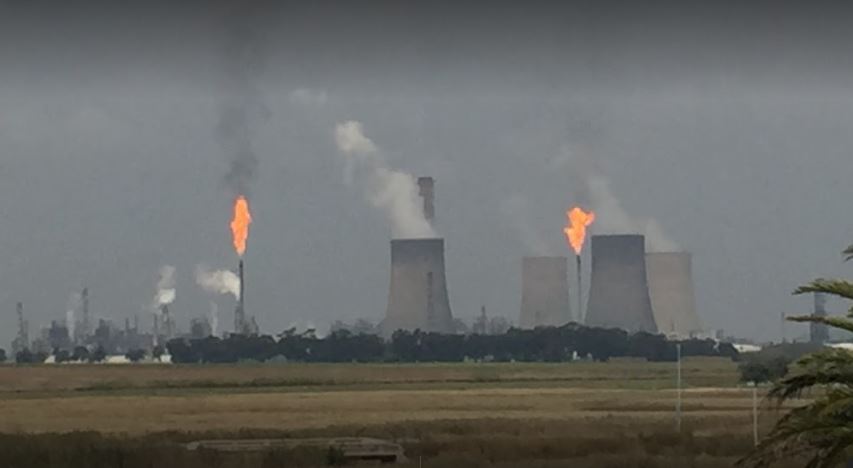- Sasol reports that Mr Brad Griffith retires on 30 June 2024, both he and Ms Brenda Baijnath have resigned as non-executive directors of the Company with effect from 31 May 2024.
- Baijnath was also CFO Senior Vice President : Sasol Energy Business.
- No reason was given for her departure.
- Dr Sarushen Pillay and Mr Walt Bruns have been appointed as replacements with effect from 31 May 2024.
- Heavily reliant of gas and coal to power their plants, South Africa’s petrochemicals giant has been very slow to respond to the global energy transition.
- Listed on the Johannesburg Stock Exchange (JSE), their shareprice has dropped 13% in the last month and a whopping 52% in the last year.

Sasol’s Synfuels plant in Secunda is the largest single-source point of emissions on the planet. The emissions from the plant exceed the individual totals of more than 100 countries. Image credit: GBA
Sasol also continues to show a culture bereft of candour and steeped in subservience. One ex staff member, currently involved in a court case with Sasol, who wishes to remain anonymous, says that “Sasol staff are so scared to talk – there is culture of fear because of previous cases of severe threats and intimidation by obscure security staff.”
Grant McGillian is a former Sasol employee who has challenged Sasol for seven years about their air quality, saying they must stop poisoning the community. Ian Erasmus, another whistle-blower and former Sasol employee currently involved in a criminal case against Sasol. Erasmus has revealed photographs of what appear to be gas clouds over Secunda. Read more
Last year, the company introduce a R35.3 billion impairment on the Secunda plant as a result of “cost assumptions and a revised production profile” based on its plans to reduce pollution from the site. Sasol’s Secunda plant is the worlds biggest emitter of greenhouse gases. The emissions from the plant exceed the individual totals of more than 100 countries. Sasol recently reported a drop in fuel production and ‘operational instability’ at their Secunda plant. Read more

Sasol share price has fallen around 52% over the last 12 months. Image credit:
The depatures of Griffith and Baijnath comes after a spate of recent high profile resignations at Sasol which includes the retirement of chairman, Stephen Westwell, who sat on the board for 12 years. Hanré Rossouw, Sasol’s Chief Financial Officer, has also resigned and will leave at the end of October 2024 after only two years in the job. Priscillah Mabelane, who was Executive Vice President: Energy Business at Sasol, resigned in March. Simon Baloyi recently replaced Fleetwood Grobler as CEO. Grobler leaves the company at the end of the year.
Related news: South African government continues to allow Sasol to exceed minimum emissions standards
Sasol has been accused of failing to transition from its dependency on fossil fuel power generation for the last decade. Civil rights groups, JustShare and the Centre for Environmental Rights, have expressed concern that Sasol has not shown any real signs of decreasing its emissions. Sasol is listed as one of 57 big companies that produced 80% of the world’s CO2emissions from 2016 to 2022, according to a new report from the Carbon Majors database.

Sasol’s shareprice has dropped 13% in the last month. Image credit: JSE
Specifically, Sasol emits some 167 kilotonnes of sulphur dioxide (SO2) from its industrial processes every year. It emits several other dangerous pollutants and is a major contributor to the toxic air quality on the Mpumalanga Highveld, which not only violates the constitutional right to a healthy environment, it also causes premature deaths, prolonged ill health and lung desease.
Related news: Government studies in South Africa finds Eskom and Sasol pollution harms children
Author: Bryan Groenendaal















1 Comment
I would like to buy sasol shares